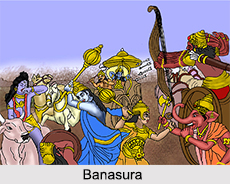 Banasura also known as Bana was a thousand-armed asura and son of Bali in the Hindu Mythology. He was a mighty Rakshasha and even the king of earth and Devas of heaven feared him. Bana was a follower of Lord Shiva. The demon ruled in present-day central Assam with his capital at Sonitpur, Banpur, and (U.P.). The Lord was so pleased with him that he asked Banasura a boon. The asura, in turn asked Shiva to come and guard the gates of his city. With Lord Shiva at his service Banasura grew more arrogant. Once Banasura told Shiva that he wished to fight with a strong and worthy opponent. The Lord fumed with his violence cursed him that he would be defeated by Lord Krishna. Thus the demon`s was defeated during a battle occasioned by Aniruddha.
Banasura also known as Bana was a thousand-armed asura and son of Bali in the Hindu Mythology. He was a mighty Rakshasha and even the king of earth and Devas of heaven feared him. Bana was a follower of Lord Shiva. The demon ruled in present-day central Assam with his capital at Sonitpur, Banpur, and (U.P.). The Lord was so pleased with him that he asked Banasura a boon. The asura, in turn asked Shiva to come and guard the gates of his city. With Lord Shiva at his service Banasura grew more arrogant. Once Banasura told Shiva that he wished to fight with a strong and worthy opponent. The Lord fumed with his violence cursed him that he would be defeated by Lord Krishna. Thus the demon`s was defeated during a battle occasioned by Aniruddha.
Legend of Banasura
According to legend once Maharishi Jamadagni with his wife Renuka came to his land. Jamadagni liked the sylvan surroundings and wanted to set up his hermitage here. Meanwhile Banasura, the wicked Rakshash had been oppressing the people a lot.
Banasur took great offence at the daring of Jamadagni and made up his mind to destroy him. He was not aware of Jamadagni`s vast knowledge and spiritual powers. Thus Banasura in order to kill him imprisoned Jamadagni in a huge cauldron full of oil and put the cauldron on fire. However to his surprise he saw that the Rishi was alive and was engaged in deep meditation. The cauldron was again put on fire and more fuel was added. A few days after the lid was again taken off and the Rishi was found to be still alive in the same meditation pose while the oil was boiling.
Banasura apologetic of this deeds feel at the feet of the rishi. The sage forgave him on the condition that that he would never return back to this region. Banasur agreed but begged that the peculiar dialect of the area known as Kanash be not uprooted. Jamadagni also accepted to his proposal.
Banasura left but the people were still afraid if he ever returned. An effigy of Banasur was made and kept in a cage which was locked up in a cellar. The idea was to destroy the effigy if Banasur would ever return and that would put an end to his life. The cellar known as "Raksa Ra Mord" was never opened.
The Kanash dialect confined to the village Malana still lingers. The dialect is not spoken anywhere else and no particular script of it. Even some people in the village particularly the Harijans are said to understand the dialect but cannot speak it.
Marriage of Banasura`s Daughter
Banasura had a beautiful daughter named Usha. The demon doubtful that her daughter might marry someone against his choice, locked her in a formidable fortress called `Agnigarh` with her friends.
Usha one day saw a young man in her dream and fell in love with him. Her friend and daughter of Kumbhanda, Minister of Banasura, Chitraleka was a great artist. She helped Usha to identify the young man seen in her dream, by sketching various portraits. Usha had dreamt of Aniruddha who was the grandson of Lord Krishna. Chitralekha, through supernatural powers, abducted Aniruddha from the palace of Krishna and brought him to Usha. Usha and Aniruddha secretly married and lived together in the Agnigarh.









